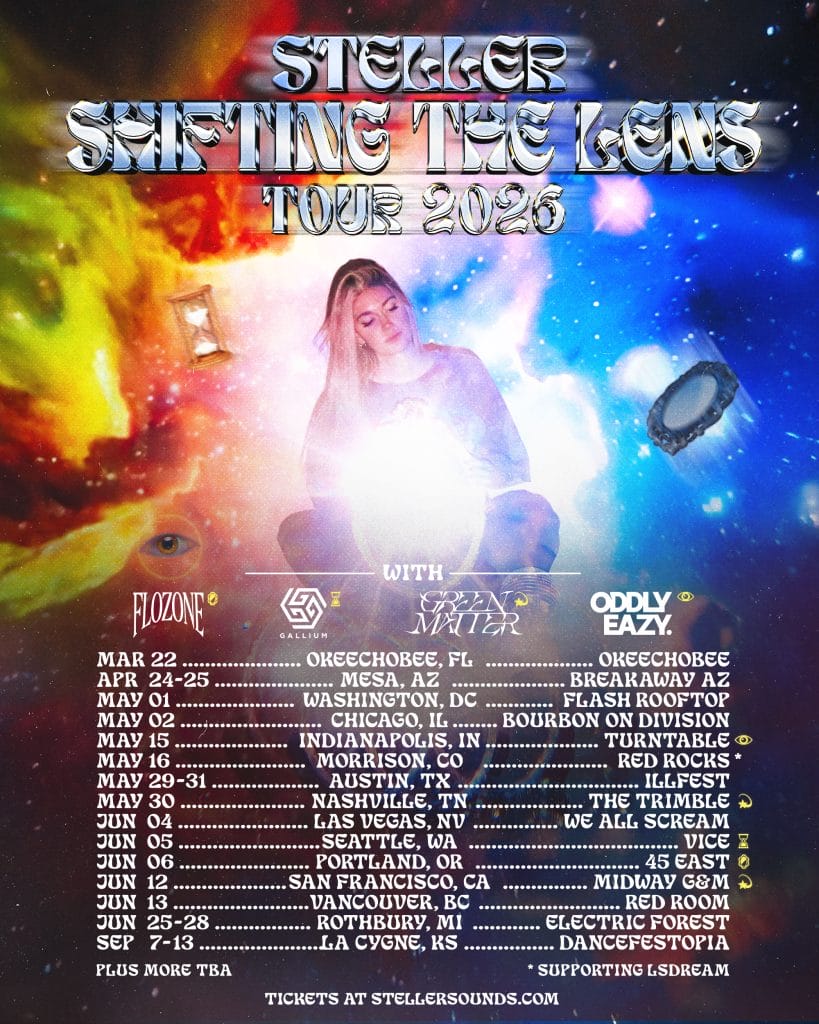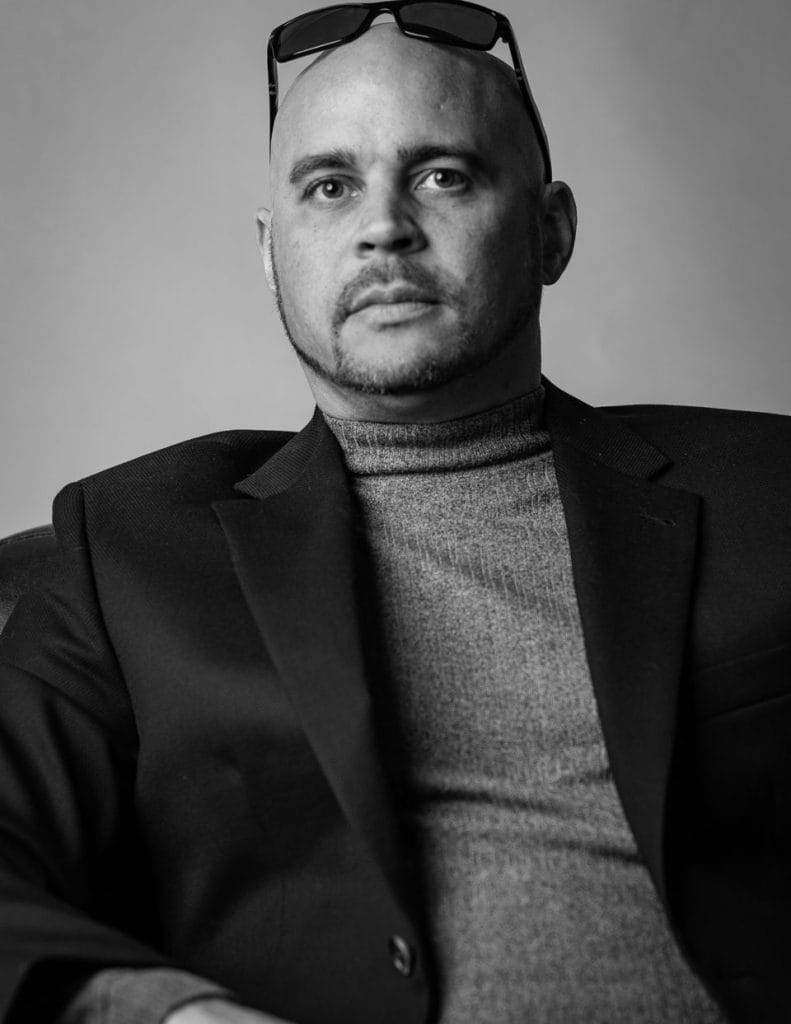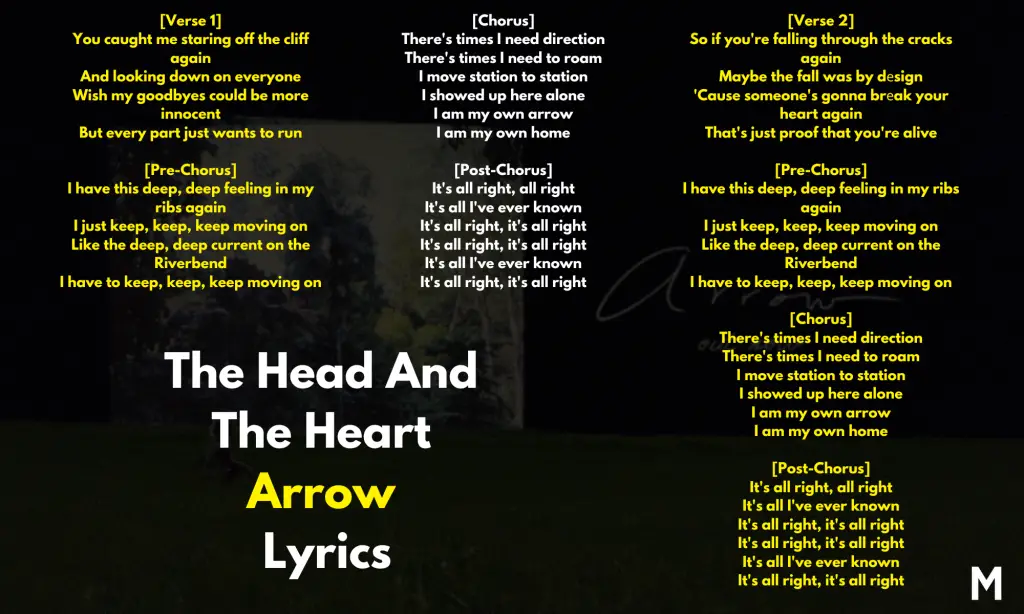Table of Contents
Image C/O Every Shade Of Music LLC And The Head And The Heart
Listening to The Head and The Heart’s new single, “Arrow,” I can’t help but dig into the poetic depth of the lyrics. I’ve spent enough time in creative writing and English lit to start making comparisons between song lyrics and classic poetry naturally.
While these are just my takeaways, I hope this analysis offers a fresh perspective on what’s happening beneath the surface. We’ll break down the lyrics, compare them to works by Robert Frost, Walt Whitman, and William Ernest Henley, and see how these writers help highlight some timeless truths in this song.
This is also a great excuse to stretch those literary muscles. I’ve always been fascinated by how modern music reflects the same themes that poets and authors have explored for years. With “Arrow,” we get to dig into ideas like self-reliance, finding direction, and pushing through life’s challenges—concepts poets have explored for generations. It’s exciting to think about how a modern indie folk song can connect back to pieces of literature that have stood the test of time.
So let’s jump in and see how all these pieces fit together.
The Head And The Heart Arrow Lyrics
The Head And The Heart Meaning
“You caught me staring off the cliff again / And looking down on everyone”
In this opening line, the speaker feels far away from everyone else. “Staring off the cliff” paints a picture of someone standing on the edge, feeling distant from the people around them. It’s like they’re thinking about big questions in life—where they are, where they’re going. When they say they’re “looking down on everyone,” it’s not about being above them, but more about feeling apart from them, disconnected.
This idea of stepping back and looking at the big picture reminds me of Robert Frost’s poem “The Road Not Taken.” In that poem, the speaker has to choose between two paths and knows that choice will shape their life. The song’s speaker is in a similar spot, thinking deeply about their life and the paths ahead.
“I have this deep, deep feeling in my ribs again”
This line feels very emotional. That “deep, deep feeling in my ribs” means that they’re carrying something heavy inside—maybe sadness, worry, or loneliness. But instead of staying stuck, the speaker keeps moving. The song says, “I just keep, keep, keep moving on,” showing that even though they feel weighed down, they don’t let it stop them.
This reminds me of Walt Whitman’s “Song of the Open Road,” where Whitman talks about walking his own path no matter what comes his way. He writes, “Afoot and light-hearted I take to the open road,” showing how important it is to keep moving forward, even when the journey is hard. In this song, the speaker is doing the same—pushing forward even when things get tough.
“There’s times I need direction / There’s times I need to roam”
Here, the speaker admits that sometimes they don’t know what they need. They want direction and guidance at times, but other times they just want to wander. The line “I move station to station” makes it clear that they are always on the go, never staying in one place for too long. This restless feeling of constantly moving shows that the speaker isn’t looking for one fixed answer in life—they’re open to change.
It’s a lot like Frost’s idea in “The Road Not Taken.” Frost’s speaker chooses a path and doesn’t know where it will lead, but he keeps going anyway. In the same way, the speaker in the song knows that sometimes life means figuring things out as you go.
“I am my own arrow / I am my own home”
This is one of the most powerful lines in the song. The speaker says they don’t need anyone else to point them in the right direction. “I am my own arrow” means they are in charge of where they go. “I am my own home” tells us that they don’t need someone else to make them feel secure—they’ve learned to rely on themselves.
This idea is also explored in William Ernest Henley’s famous poem “Invictus.” In that poem, Henley writes, “I am the master of my fate, I am the captain of my soul.” Both Henley and the song’s speaker are saying the same thing: I’m in control of my life, no matter what happens around me.
“Someone’s gonna break your heart again / That’s just proof that you’re alive”
In this line, the speaker is being very real. They know that heartbreak and pain are part of life, but they don’t see it as something to fear. Instead, they believe that getting hurt shows that you’re living fully and feeling deeply. “That’s just proof that you’re alive” means that going through hard times is part of being human.
This acceptance of pain reminds me of “Invictus” again. In that poem, Henley talks about facing life’s struggles with courage. Even when things get tough, Henley’s speaker says, “My head is bloody, but unbowed,” meaning that no matter how much pain he goes through, he won’t give up. The speaker in the song is doing something similar—accepting that pain is part of life but refusing to let it stop them from moving forward.
“It’s all right, it’s all I’ve ever known”
When the speaker repeats “It’s all right” over and over, it feels like they’re reassuring themselves. They’ve gotten used to being on their own, always moving, always facing hard times. But they don’t seem upset about it anymore. Saying “it’s all I’ve ever known” tells us that this is their normal—they’re used to being strong and self-reliant.
This echoes themes in “The Road Not Taken” and “Invictus,” where both speakers accept their choices and their paths, no matter how hard or lonely. In the same way, the speaker in this song finds peace in their situation. They’ve learned to be okay with the fact that they’re always moving forward, no matter what.
Themes, Meanings, and Main Takeaways
At its heart, “Arrow” by The Head and The Heart is a song about self-reliance, movement, and emotional resilience, all timeless themes we’ve seen throughout literature. The lyric “there’s times I need direction / there’s times I need to roam” stands out to me because it highlights this tension between the desire for stability and the pull toward freedom. It reminds me of Robert Frost’s “The Road Not Taken,” where the speaker is forced to choose a path without knowing where it will lead.
Frost’s poem reflects on how every choice changes our direction in life, and in “Arrow,” we get that same sense. The speaker is always moving, station to station, unsure of exactly what’s next, but fully aware that the journey itself is what matters.
The song also dives deep into the theme of self-reliance, especially in the line “I am my own arrow, I am my own home.” This lyric feels like an anthem of independence. It reminds me of William Ernest Henley’s poem “Invictus,” where Henley famously writes, “I am the master of my fate, I am the captain of my soul.” There’s a strong parallel here: both Henley’s speaker and the speaker in “Arrow” have accepted that life’s challenges can’t be avoided, but the power to keep going lies within.
Jonathan Russell, the band’s lead singer, has said that the song is about being your own anchor and trusting yourself to keep going, even when you feel lost. Just like Henley’s poem, the message in “Arrow” is clear—self-reliance is key, and you have to be your own guide.
Another huge theme in “Arrow” is constant movement, which is captured in the lyric “like the deep, deep current on the Riverbend.” This natural imagery of flowing water immediately brings to mind Walt Whitman’s “Song of the Open Road.” In that poem, Whitman celebrates life as an open journey, where movement and freedom are essential. There’s no fixed end in sight, just the understanding that the road itself will shape who we are.
Similarly, the speaker in “Arrow” always moves forward, flowing like the current. In the song and Whitman’s poem, there’s this shared sense of embracing the journey—no matter how uncertain—because growth happens in that movement. Russell has talked about how “Arrow” marks a return to the band’s indie roots, and you can feel that restless, searching energy throughout the song.
The post The Head And The Heart Arrow Lyrics And Meaning: Exploring Movement, Pain, And Poetry appeared first on Magnetic Magazine.






